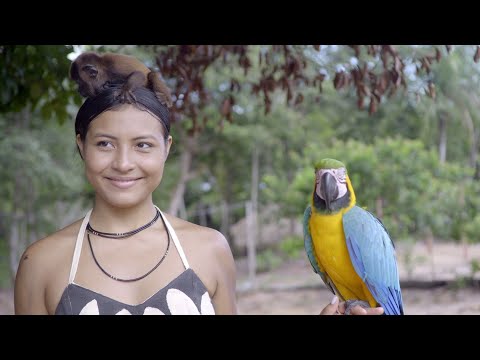
World's largest rainforest conservation initiative credited with helping Brazil achieve a four-year decline in deforestation rates
WASHINGTON, June 7, 2012 – The world's largest rainforest conservation initiative, a joint project of the World Bank and Global Environment Facility (GEF), received the inaugural Development Impact Honors award from the U.S. Department of the Treasury today for helping Brazil achieve a four-year decline in deforestation rates. Treasury's award to the Amazon Region Protected Areas (ARPA) program recognizes effective projects implemented by multilateral development banks that promote growth and meet the needs of poor and vulnerable populations around the world.
Creation of protected areas has an important impact on avoiding deforestation by providing clear policy signs and environmental enforcement, supporting traditional peoples, redirecting territorial occupation, and making conservation-based businesses more attractive. When all phases of ARPA are complete, it will encompass an area over 50 percent larger than the U.S. National Parks, and at a fraction of the cost.
The World Bank-implemented ARPA program has two phases financed with US$46 million in grants from the GEF. ARPA is a long-term initiative launched in 2002 in Johannesburg, South Africa, in partnership with the Government of Brazil, the Brazilian Biodiversity Fund (Funbio), the World Bank, GEF, the World Wildlife Fund (WWF) and the German Development Bank (KfW).
"We are very honored to receive this recognition and feel privileged to have the opportunity to partner with Brazil and others to conserve the Amazonian forests for the present and future generations," said Sri Mulyani Indrawati, World Bank Managing Director, during her remarks at the award ceremony. "The ARPA program is innovative and has delivered results in an unprecedented fashion. Through ARPA, we have been able to assist Brazil in its efforts to reduce deforestation while gaining valuable experience that can be shared globally."
"This effort represents an unprecedented demonstration of synergies between protecting tropical forest biodiversity, reducing emissions from deforestation and supporting sustainable livelihoods of local communities," said Monique Barbut, CEO and Chairperson of the GEF. "ARPA's two phases are ensuring the protection of nearly 70 million hectares of rainforest, which will save more than 1.1 billion tons of CO2 emissions through 2050."
Collectively, these forests cover an area larger than Texas or the Ukraine, store more than 4.6 billion tons of carbon, or about 18 percent of the Amazon's total carbon stock, and are home to countless thousands species of plants and animals. Since its inception, ARPA has accounted for 37 percent of the decrease in deforestation in the country, and for 46 percent of all protected areas created in the world. The first phase of the program (2003-2008), supported by US$30 million in GEF grants, created 24 million hectares of new protected areas, helping to protect biodiversity, build knowledge about the Amazon, and foster respect for the rights of local people.
The second phase of the program, backed by US$16 million in GEF grants and now under implementation, will create 13.5 million hectares of additional new protected areas (an area larger than Greece) in the next four years, including parks, biological reserves, ecological stations, extractive reserves and sustainable development centers. This phase will also help consolidate 32 million hectares of existing areas.
With an area of 4.1 million km2, the Brazilian Amazon is the largest continuous rainforest in the world, providing essential global environmental benefits, specifically in terms of biodiversity, carbon
sequestration and climate change mitigation. It is also home to 24 million people, who have lower than average income and live in less urbanized conditions than the rest of the country.
Due to Brazil's clean energy matrix, carbon emissions from land use change and deforestation represent 45 percent of the country's total annual emissions. Multiple strategies have been implemented to counter the destruction of the forest and the establishment of protected areas has proved to be a very efficient one.
###
For additional information on the award ceremony refers to the press release prepared by the U.S. Department of the Treasury.
On the GEF and the World Bank
The Global Environment Facility (GEF) unites 182 countries in partnership with international institutions, civil society organizations (CSOs), and the private sector to address global environmental issues while supporting national sustainable development initiatives. Today the GEF is the largest public funder of projects to improve the global environment, providing grants for projects related to biodiversity, climate change, international waters, land degradation, the ozone layer, and persistent organic pollutants. Since 1991, the GEF has provided US$10.5 billion in grants and leveraged US$51 billion in co-financing for over 2,700 projects in over 165 countries. For more information, visit www.thegef.org.
The World Bank is one of GEF's implementing agencies and supports countries in preparing GEF co-financed projects and supervising their implementation. The Bank plays the primary role in ensuring the development and management of investment projects. The Bank draws upon its investment experience in eligible countries to promote investment opportunities and to mobilize private sector, bilateral, multilateral, and other government and non-government sector resources that are consistent with GEF objectives and national sustainable development strategies.
World Bank contacts:
In Washington: Patricia da Camara, (+1 202) 473-4019, pdacamara@worldbank.org
In Brasilia: Juliana Braga (+55 61) 3329-1099, jmachado1@worldbank.org
GEF contacts:
In Washington: John Diamond (+1 202) 458-7953, jdiamond@thegef.org
- For more information, please visit: http://www.worldbank.org/br
- Visit us on Facebook: http://www.facebook.com/BancoMundialBrasil
- Be updated via Twitter: http://www.twitter.com/WorldBankLAC
- For our YouTube channel: http://www.youtube.com/user/BancoMundialBrasil
- For more information, please visit the Projects website.
Alexandre Pinheiro Rego
Senior Communications Officer
arego@thegef.org


